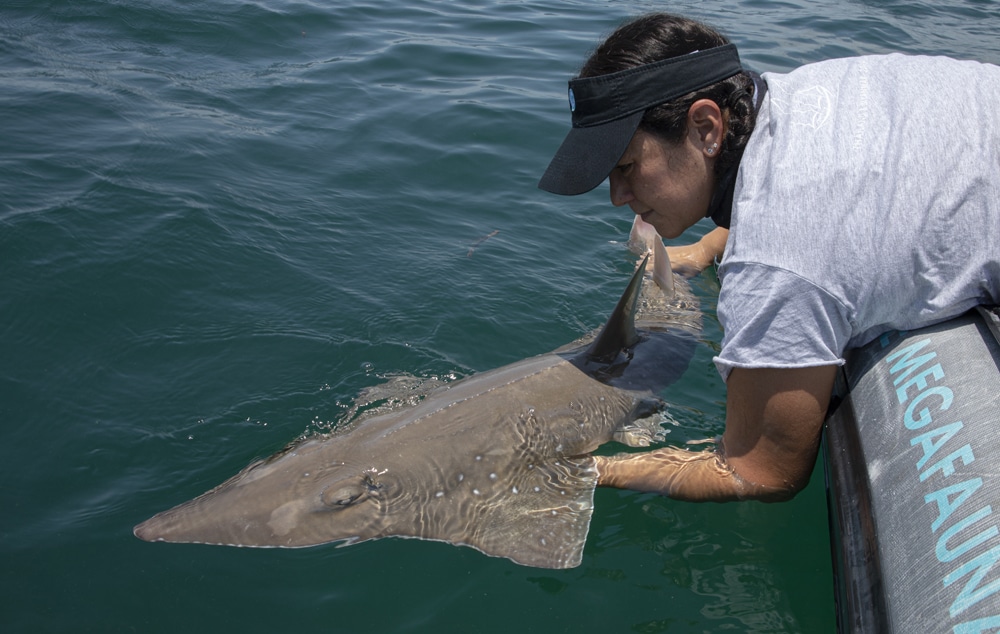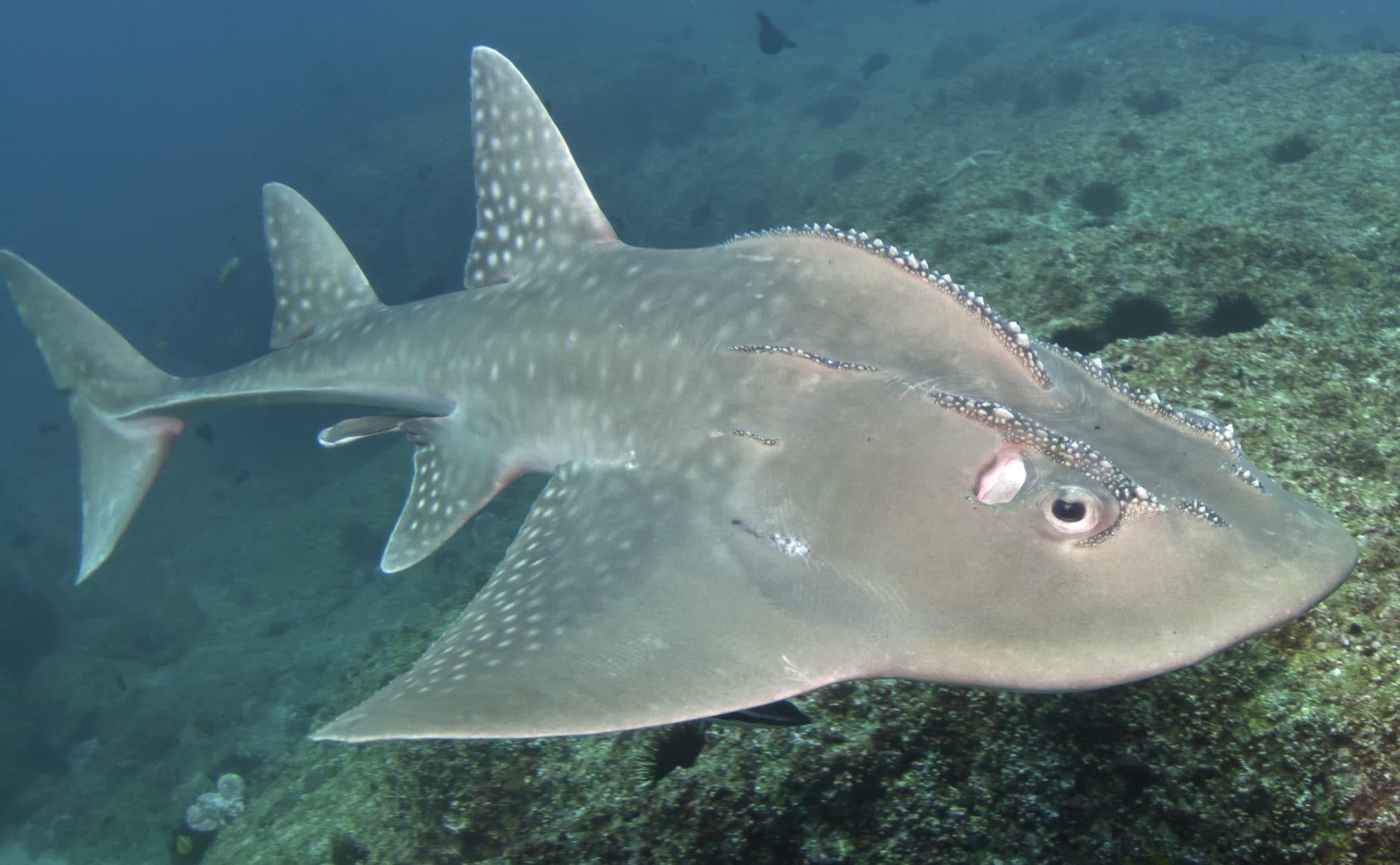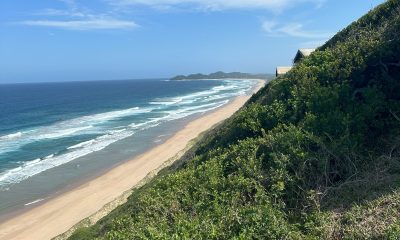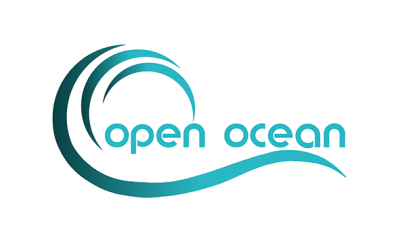Marine Life & Conservation
First of its kind Wedgefish tagging study
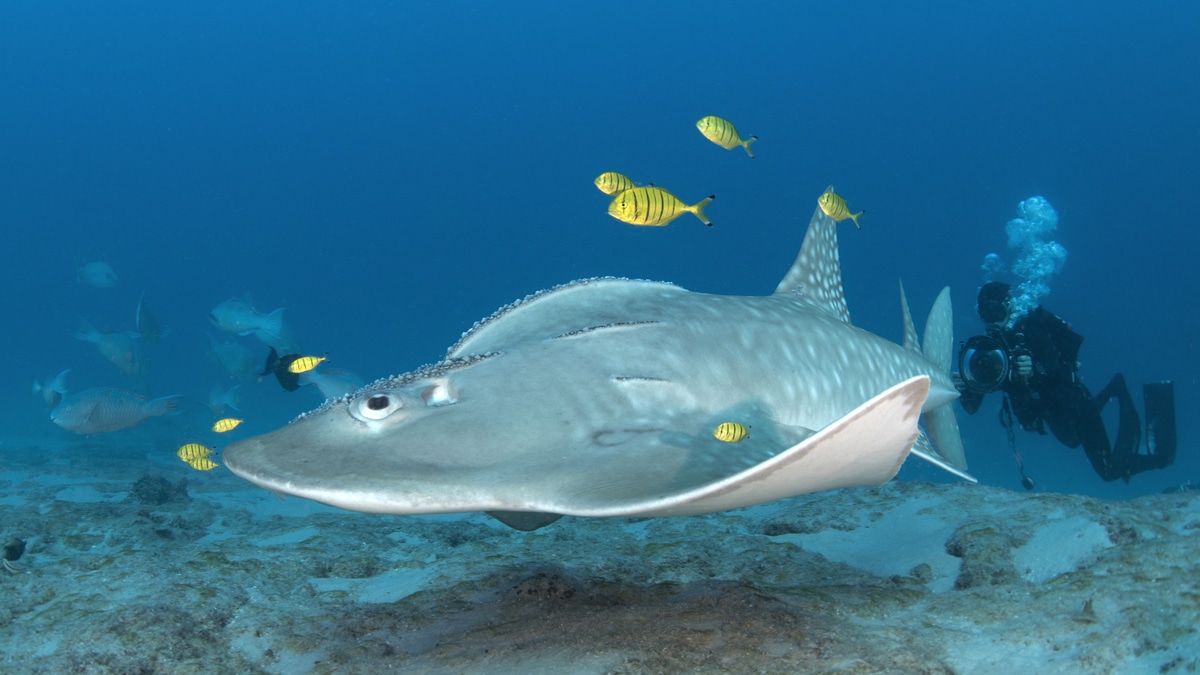
 Scientists from the Marine Megafauna Foundation (MMF) have placed acoustic and pop-up archival satellite tags on two species of wedgefish, the bottlenose wedgefish (Rhynchobatus australiae) and the bowmouth guitarfish (Rhina ancylostoma), kickstarting a first of its kind study for these species in Mozambique.
Scientists from the Marine Megafauna Foundation (MMF) have placed acoustic and pop-up archival satellite tags on two species of wedgefish, the bottlenose wedgefish (Rhynchobatus australiae) and the bowmouth guitarfish (Rhina ancylostoma), kickstarting a first of its kind study for these species in Mozambique.
Bottlenose wedgefish and bowmouth guitarfish are listed as Critically Endangered by the IUCN Red List of threatened species. Both are species of ray and members of the family Rhinidae, collectively known as wedgefish, a group recently identified as one of the world’s most endangered marine fish.
Wedgefish are characterized by a life history of slow growth, late maturity, and low reproductive rates, making them particularly susceptible to population decline from overexploitation. They are captured across the globe in commercial and artisanal fisheries using various types of fishing gear including nets, trawls, longlines, and handlines. They are either targeted or retained when caught as bycatch, as their fins are highly valued in the shark fin trade. Very little is known about the biology or ecology of these rays and consequently few management plans exist to protect declining populations worldwide.
The study is taking place in the protected waters of the Bazaruto Archipelago National Park and the Vilanculos Coastal Wildlife Sanctuary. MMF researchers are working alongside park authorities and managers to identify primary aggregation sites for these species, understand their movements and home range, and identify the threats they may face in the region.
The two types of tag provide different, yet complementary, information that can be used to investigate fine and broad-scale movements. “By using this particular combination of tags, we can learn where the animals spend most of their time, whether visits to specific sites are year-round or seasonal, how far they move, how deep they dive, and which temperatures they prefer,” explains Dr. Andrea Marshall, MMF co-founder and co-lead of the project. “This will help to identify areas of critical habitat that must be prioritized for protection.”
Acoustic tags are small transmitters that emit a unique acoustic signature, which is detected by an array of underwater acoustic receivers or ‘listening stations’ whenever a tagged animal comes within a few hundred meters. The Mozambican acoustic array spans from the Bazaruto Archipelago to Ponta do Ouro on Mozambique’s southern border and is managed collaboratively by MMF, Oceans Without Borders, and South Africa’s Oceanographic Research Institute. The receivers store the information from tags and researchers collect the receivers every few months to download the data and see which of the tagged animals have been detected. The batteries on acoustic tags last up to 5 years, providing valuable long-term insight into the movement patterns of tagged species.
Pop-up satellite archival tags (or PSAT/miniPAT tags) are attached to the dorsal fin of the wedgefish and record depth, temperature, and light-level data. Light-level data is used to determine the location of the animal through ‘light-based geolocation,’ where sunrise and sunset times are used to predict location. Data are collected and summarized in the internal memory of each tag, ready to be transmitted. These particular tags are programmed to stay attached to the wedgefish for 6 months, before detaching, floating to the surface, and transmitting a summary of the archived data back to scientists via the ARGOS satellite network. These tags also provide valuable information on vertical movements (diving behavior), depth, and temperature preferences.
With so little known about wedgefish and their relatives globally, researchers are intrigued to see what these tags will show. “We are very excited to see what the tags can tell us about these curious animals,” says Dr. Marshall. “With such little information available, we truly aren’t sure what to expect. Wedgefish could easily be compared to the pangolin of the ocean. They are rare, elusive, critically endangered, and fished intensively for their fins. Just like pangolins, they require urgent protection. No doubt the data from this study will give us a better understanding of how to better protect these species in Mozambican waters — a global stronghold for wedgefish.”
“We are proud to be able to participate in and benefit from this groundbreaking research,” says David Gilroy, General Manager of the Vilanculos Coastal Wildlife Sanctuary. “We rely heavily on the input of MMF scientists to inform the management of our protected area and the local environment at large, and we hope that the data shared with us in time will help us to better protect and safeguard these incredibly important species and their habitats.”
The MMF team in Vilanculos will continue to deploy additional tags in the coming months. The work is supported by the Blue Action Fund, the Mohamed bin Zayed Species Conservation Fund, Ocean Wildlife Project, and a number of private donors.
For more information about the work of MMF visit their website by clicking here.
Marine Life & Conservation
Paul Watson Released as Denmark Blocks Japan’s Extradition Bid

Renowned anti-whaling activist Paul Watson has been released from custody in Greenland after spending five months in detention. Denmark’s Justice Ministry rejected Japan’s request for his extradition, citing insufficient guarantees that his time already served in custody would be credited against any potential sentence.
The 74-year-old Canadian-American was arrested on July 21 in Nuuk, Greenland’s capital, when his ship docked to refuel. His arrest was based on a 2012 Japanese warrant related to a 2010 encounter in Antarctic waters. Japan alleged Watson obstructed operations and caused damage to a whaling research ship during efforts to disrupt illegal whaling. Watson has consistently denied these claims, maintaining his commitment to marine conservation.
Denmark, which oversees extradition matters for Greenland, concluded that while the legal conditions for extradition were met, the lack of assurances from Japan regarding time-served credit made extradition untenable.
In a video shared by his foundation, Watson expressed gratitude and relief, saying, “After five months, it’s good to be out… and good to know they’re not sending me to Japan.” He added that the most difficult part of his time in custody was being separated from his two young sons.
Watson is a pioneering figure in marine conservation, known for founding the Captain Paul Watson Foundation in 2022 after decades of activism with the Sea Shepherd Conservation Society. His bold efforts to defend marine life have earned him widespread support, including from celebrities and conservationists. His work has also been featured in the acclaimed reality TV series Whale Wars.
Watson’s lawyer, Jonas Christoffersen, praised the decision, stating, “We are happy and relieved that Paul Watson is now free.” He added that Watson is eager to reunite with his family and continue his vital work.
The arrest occurred while Watson’s vessel, the M/Y John Paul DeJoria, was en route to the North Pacific with a team of 26 volunteers to intercept a Japanese whaling ship. His foundation described the arrest as politically motivated and emphasized that Watson’s actions were focused on ending illegal whaling practices.
Japan resumed commercial whaling in 2019 after leaving the International Whaling Commission, asserting that whale meat is a cultural tradition. Conservationists, however, continue to challenge these practices, highlighting their impact on marine ecosystems.
Despite the challenges, Watson remains steadfast in his mission to protect marine life and bring attention to whaling practices. His dedication to ocean conservation has made him a globally respected advocate for the environment.
Marine Life & Conservation
12 Days of Zero-Waste Fish-mas

This holiday period, the Marine Conservation Society, the UK’s leading ocean membership charity, invites you to make some simple changes to eating fish this Christmas to help our seas.
Dr Kenneth Bodles, Head of Fisheries and Aquaculture at the Marine Conservation Society, said, “During the festive season, our consumption increases, but so does waste. Sustainability isn’t just about where food comes from – it’s also about how you use it. By reducing waste and making the most out of your seafood, you’re not only taking steps to be more ocean-friendly, but can also help to cut costs during what is often one of the most expensive times of the year”.
The Marine Conservation Society has compiled twelve tips on how to consume seafood sustainably with zero-waste this Christmas:
Buy whole fish instead of fillets
Instead of fillets, consider buying whole fish such as salmon, hake, or lemon sole. By adopting a “nose to tail” approach with cooking, whole-baked fish not only feeds a crowd, but also helps to minimise waste and maximise sustainability by using up every part of the animal, including bones, skin, and fat.
Make fish stock
Leftover fish bones or shells can be put to good use by boiling them to make a nourishing fish stock or bisque. This can be frozen and preserved for later use and makes for a flavourful base in a soup.
Make your own fish pâté
Avoid waste by turning leftover fish, such as smoked mackerel or salmon, into a delicious pâté by blending with cream cheese and lemon. Perfect when paired with crackers.
The sustainability of salmon and mackerel varies depending on where and how it is caught or farmed. For more information on green-rated options, check the charity’s Good Fish Guide.
Buy frozen
By purchasing seafood that is frozen or vacuum-packed, this helps to reduce waste by extending the shelf life of your food.
Fish pie
If you’re wondering what to do with leftover cooked fish, why not opt for a classic fish pie with mashed potatoes, leeks, and a cheesy sauce? A sure crowd pleaser on Boxing Day.
Use the head
Don’t forget the fish head! The meat is incredibly tender and flavourful. The charity recommends a cod’s head curry or recreating Fallow’s renowned cod’s head in siracha butter.
By stretching your ingredients further, not only is this a more sustainable way to enjoy seafood, but also cost-effective by repurposing leftovers and cooking creatively.
Boxing Day brunch
Mix leftover kippers or smoked salmon with scrambled eggs for a tasty, zero-waste, Boxing Day brunch.
For best choice, make sure you buy kippers, or herring, from the North Sea and the North Irish Sea.
Zero-waste storage
A top tip from the Marine Conservation Society to avoid waste is freezing fish offcuts to save for future use.
Crisp up the skin
Even leftover fish skin can be turned into a quick savoury snack by crisping it up in an air fryer with a little olive oil and salt.
Anchovies two ways
Leftover anchovies can either be blended with butter to make a delicious anchovy butter or tossed into pasta for a hit of umami flavour.
The charity recommends opting for anchovies caught in the Bay of Biscay for best choice.
Fishcakes
For an easy, zero-waste meal, leftover seafood trimmings can be mixed with mash and fried in breadcrumbs to make fishcakes.
Pickled mussels
Try pickling mussels in 1:1 vinegar and water, with a dash of sugar for a sustainable, zero-waste snack that can be enjoyed well beyond the festive season.
Mussels farmed in the UK are a seafood superhero. Grown using low-impact methods and harvested by hand, they get all the food they need from the sea around them. This makes them one of the most sustainable, ocean-friendly, and cost-effective seafood options.
Players of People’s Postcode Lottery have raised £6.6M towards the Marine Conservation Society’s vital work in making seafood more sustainable.
Laura Chow, Head of Charities at People’s Postcode Lottery, said: “Fish is a festive favourite for many, but making sustainable choices when it comes to how we buy and eat seafood makes all the difference for our ocean. Support from players of People’s Postcode Lottery has helped the Marine Conservation Society further its sustainable seafood work, so that we can all enjoy healthier, better protected seas.”
The Marine Conservation Society encourages you to make sustainable seafood choices a year-round habit, not just for Christmas. To check how sustainable the seafood on your plate is, you can visit the charity’s Good Fish Guide. The Guide helps consumers and businesses identify the most sustainable seafood using a simple traffic light system, based on where and how species are caught or farmed. Green is the best choice, amber means improvements are needed, and red indicates fish to avoid buying.
Zero-waste gift idea
Why not embrace a zero-waste Christmas by gifting a membership to support marine conservation? It’s a meaningful, low-waste gift that helps protect our ocean for generations to come. Memberships start from as little as £5 a month – the price of a sandwich and drink from your local coffee shop.
Find the latest sustainable seafood advice for wild-caught and farmed seafood on the Good Fish Guide, downloadable to your phone from www.mcsuk.org/goodfishguide.
-

 News3 months ago
News3 months agoIconic SS United States to become the World’s Largest Artificial Reef
-

 Blogs2 months ago
Blogs2 months agoScubaverse Christmas Gift Guide 2024: Day 4
-

 News2 months ago
News2 months agoSanta Divers take the Plunge for Charity
-

 Blogs2 months ago
Blogs2 months agoScubaverse Christmas Gift Guide 2024: Day 1
-

 News3 months ago
News3 months agoDiscover Turquoise Divers and Media Luna Beach & Dive Resort: A Premier Diving and Relaxation Destination in Roatan
-

 Blogs2 months ago
Blogs2 months agoScubaverse Christmas Gift Guide 2024: Day 5
-

 Blogs2 months ago
Blogs2 months agoScubaverse Christmas Gift Guide 2024: Day 2
-

 News3 months ago
News3 months agoToucan Diving at Plaza Beach and Dive Resort Bonaire Introduces PADI Mermaid Training


